By Mehreen Khan 29 April 2015
Syriza's radical Leftist energy chief warns Grexit will land a 'mortal blow' to monetary union
Alexis the Saviour: time is running out for Greece's Leftist premier to avert a insolvency
Hopes that a revamped Greek bail-out team would finally break a two-month deadlock with creditors took a fresh blow on Wednesday, as the Leftist government's firebrand energy minister pledged "no surrender" to international lenders.
Highlighting a deep schism within the ruling party over Greece's future in the single currency, Panagiotis Lafazanis said there could be "no compromise" with creditor powers, who were seeking "subordination and surrender" from his government.
"Our government will not bow down, neither will it surrender," wrote Mr Lafazanis in a Greek newspaper. "Syriza will not accept an agreement that would be incompatible to its radical commitments."
A popular figurehead of the party's radical Left Platform, Mr Lafazanis attacked the Troika for "water-boarding" the Greek economy, choking its people into submission.
"If our 'partners' and the IMF believe that they will blackmail us using the refusal of financing as a weapon, and that they will terrorise the Greek people forever using the 'bogeyman' of default and of a national currency, they are woefully deluded."
The energy minister, who has ties with Moscow, has been one of the fiercest critics of the Troika's plans to undercut Athens' promises to address Greece's "humanitarian crisis" through raising wages and pensions for the poorest.
Syriza's energy chief has pushed the country's towards the Kremlin (Source: AFP/Getty)He added the country could gradually get on its feet after a euro exit, but warned monetary union would be "subjected to a grave and mortal wound" should Greece be forced out.
The intervention comes amid hope that Athens was edging closer to agreeing the basis for its reforms-for-cash programme, after a two-month hiatus that has pushed the country towards insolvency.
A newly established Greek bail-out team, headed by Oxford-educated minister Euclid Tsakalotos, was due to present a draft reform list to officials in Brussels on Wednesday.
The appointment of the softly-spoken Marxist economist came after Brussels had grown increasingly exasperated by the stalling tactics of finance minister, Mr Varoufakis.
But insisting he was still at the forefront of talks, the "rock-star" former academic said he remained "in charge of the negotiations with the euro group".
Mr Varoufakis's comments came after he was attacked by a group of self-styled anarchists at an Athens restaurant with his wife on Tuesday night. The finance minister managed to emerge unscathed from the episode, after group of hooded individuals threw glass objects at the couple.
Stark new figures released on Wednesday showed that Greek bank deposits had fallen to a 10-year low, as people were continuing to pull money and assets out of the financial system.
Bank deposits fell by a further €2.5bn in March, with more than €26bn having fled the country since December 2014.
Depleted deposits have been partially offset by ever-increasing amounts of emergency bank funding (ELA) from the European Central Bank.
The ECB was forced to plug the gap once again on Wednesday, raising its ELA limit by a further €1.4bn. Nearly €77bn has now been pumped into Greek banks, which have been cut off from ordinary loans since February.
Head of the Eurozone's finance ministers, Jeroen Dijsselbloem, said the ECB would not consider loosening its grip over the country until a deal was struck.
"The Greek government gambled that if it negotiated with us, the ECB would open its cashier windows," said the Dutch finance minister.
"But there will be no easy access to the ECB's windows until there's a solid agreement with the Euro group," said Mr Dijsselbloem. "That's been made clear to them time and time again."
"Without further loans, Greece won't make it, that's the reality."
'We won't surrender': Firebrand Greek minister risks fresh schism with Europe - Telegraph
![The [Greek] European Tragedy](https://blogger.googleusercontent.com/img/b/R29vZ2xl/AVvXsEiWKI5s90SFm1wWTk6bs4p7CgslaC2SnYPsrZhb-B-smOufNNCSxCvpBLI9hOB-LsXZjir_PNmEiMk2-E62F3xkg96IoC6QFAaZAnPRTVH340IN9WBRmWJqPkjWlgyRj3zpALp7h6hvA58/s920/GkBack_new.jpg)



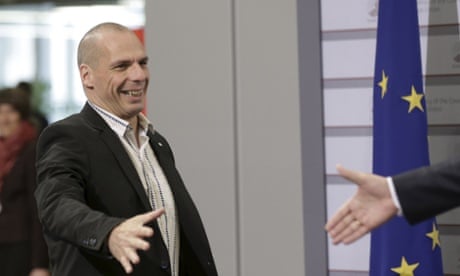


 Graffiti by Greek street artist Achilles in central Athens. The country remains in crisis mode as it continues talks with creditors. Photograph: AP
Graffiti by Greek street artist Achilles in central Athens. The country remains in crisis mode as it continues talks with creditors. Photograph: AP 



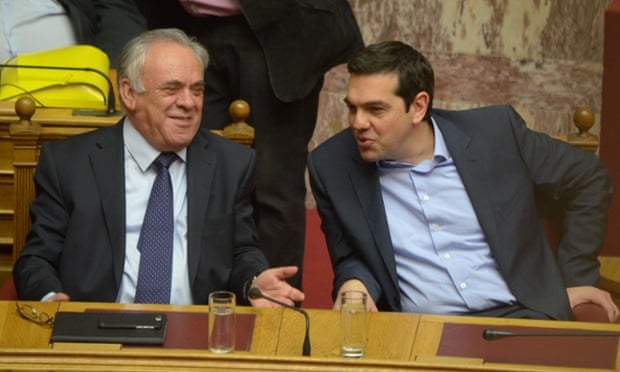

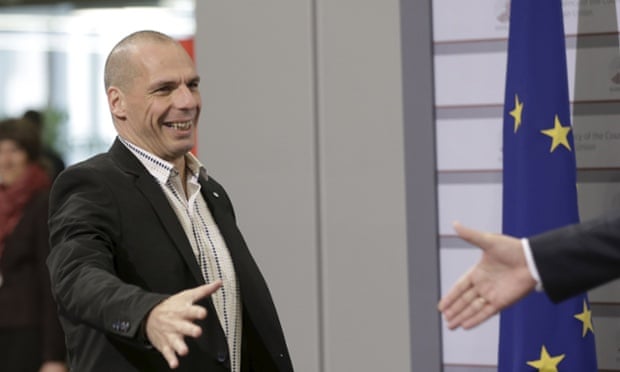



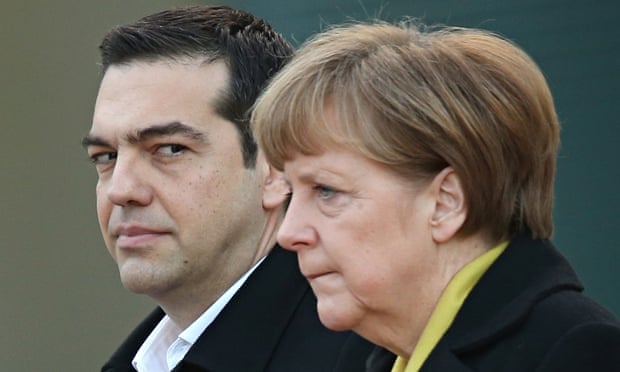
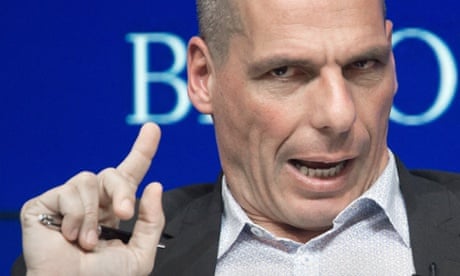
 The government plans to generate up to €2bn by seizing reserves in commercial banks
The government plans to generate up to €2bn by seizing reserves in commercial banks 

 Greek banks have been under the squeeze as people have drawn their money out in droves
Greek banks have been under the squeeze as people have drawn their money out in droves 


 Prime Minister Alexis Tsipras welcomes the head of the Russian energy giant Gazprom, Alexei Miller (Source:ANA)
Prime Minister Alexis Tsipras welcomes the head of the Russian energy giant Gazprom, Alexei Miller (Source:ANA) 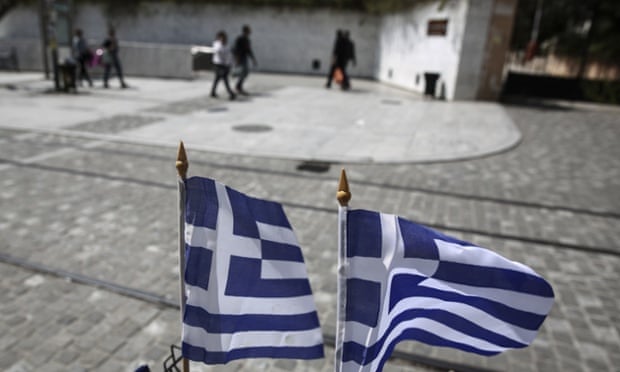 Greek flags flutter in an Athens street as the government remains locked in strained negotiations with creditors. Photograph: Yorgos Karahalis/AP
Greek flags flutter in an Athens street as the government remains locked in strained negotiations with creditors. Photograph: Yorgos Karahalis/AP 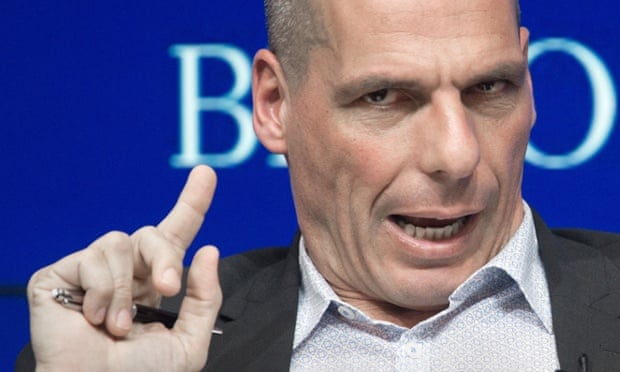 The Greek finance minister, Yanis Varoufakis, speaking at the Brookings Institute in Washington. Greece is due to repay almost €1bn to the IMF in early May. Photograph: Paul Richards/AFP/Getty
The Greek finance minister, Yanis Varoufakis, speaking at the Brookings Institute in Washington. Greece is due to repay almost €1bn to the IMF in early May. Photograph: Paul Richards/AFP/Getty 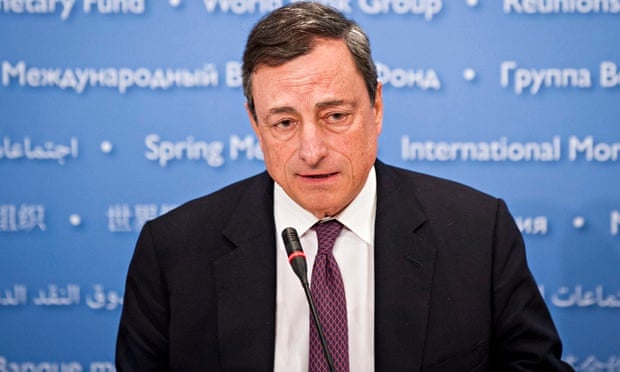 Mario Draghi, head of the European Central Bank, addresses a press conference in Washington on 18 April 2015. Photograph: Pete Marovich/EPA
Mario Draghi, head of the European Central Bank, addresses a press conference in Washington on 18 April 2015. Photograph: Pete Marovich/EPA  A deal between Russia and Greece is expected to be signed on Tuesday
A deal between Russia and Greece is expected to be signed on Tuesday 




